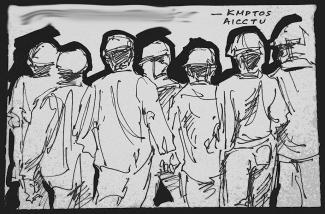
A recent order by Tamil Nadu High Court upholding labour laws in a case of Coimbatore’s Pricol workers has come as a rare and welcome relief for the trade union movement and activists. The judgement is all the more significant because in recent years there have been a spate of anti-worker judgements in various Courts. The TN HC Order by Justice V. Parthiban held that violating the workers’ rights to unionise and using delaying tactics to avoid giving workers their due, amounts to a violation of fundamental rights as enshrined in the Constitution.
The judgement invoked Article 226 of the Constitution in the case of Pricol Workers Union (Kovai Mavatta Pricol Thozhilalar Otrumai Sangam, KMPTOS) which is fighting against arbitrary and unlawful dismissal of 294 workers in the factory as well as in the legal arena. It emphasised the fact that this is in public interest to defend workers’ rights against an act of injustice involving a large number of workers.
Pricol Workers’ Union had given a charter of demands to the management for a new wage settlement in January 2018 which was a routine matter to all, but the management responded with a partial lockout (read retrenchment) of 144 workers on 16 August 2018. The Union’s motive was only to renew the earlier wage agreement and service conditions which was due to expire in June 2018. Against this ‘hostile discrimination’ the Union went on an indefinite strike 21 August 2018 which continued for nearly hundred days, till the state government came into action and a tripartite conciliation talk was initiated by the end of November leading to an amicable settlement between management and the Union. But to everybody’s dismay the management not only backtracked from its own agreement, it also illegally handed over ‘transfer’ orders to 302 of its workers when they went to join their work on 3 December. These transfers were nothing less than the continuing victimisation tactics and a glaring unfair labour practice by the management. The Union again approached the District Collector, the Labour Department and all the government functionaries it could have approached, against this brazen violation of the Industrial Dispute Act. But the management, after engaging with the Labour Department for a brief spell, went on to dismiss 294 workers.
The High Court granted an interim order of stay on the dismissal order passed against 294 workers, with a comment that the “Management has a public duty under the provisions of the I.D. Act” because such an en masse dismissal “cannot by any stretch of legal standards be held as a private dispute.”
The “Court has to necessarily live up to the fundamental expectation of citizens and extend its arms to protect certain sections of citizenry from being victimized even before initiation of adjudicatory process” says the judgement, and further added that “Pendency of industrial dispute for many years in the legal fora in fact, helps the Management to wear the workmen down. Delay in disposal of dispute of this nature when such dispute caught in the legal web and rigmarole would certainly cause incalculable hardship and inflict considerable harm on the morale of the workmen in this fight against perceived injustice befallen them at the instance of the Management. The dispute of this nature in the protracted litigious course invariably push the weaker party i.e. the workmen to the precipice of despair and helplessness, notwithstanding safeguards provided under the industrial laws.”
For more than a decade Pricol Coimbatore workers are fighting a valiant battle against all odds in face of persistent discrimination and repression for their very basic trade union rights and livelihoods. Eight of their leaders were sentenced to ‘double life imprisonment’ by a lower court but this decision was overturned by the High Court for the six of them, while two leaders are still in jail. This is quite an unequal battle between workers and the management in administrative and judicial arena, but at the same time this struggle is unparalleled in terms of indomitable working class spirit and solidarity.
The latest judicial order in favour of workers is a timely and much sought after relief but the actual struggle still continues after this verdict which directs the conciliation officer to comply within eight weeks and pass an order of reference as per the statutes. The usual time-taking process may result in the judicial order once again getting ‘caught in the legal web and rigmarole’ (to use a phrase from the verdict itself), but it will not in any way “wear the workmen down” – since the workers’ movement of Pricol Coimbatore has shown in the past decade that it is not easily worn down.
Liberation Archive
- 2001-2010
-
2011-2020
- 2011
- 2012
- 2013
- 2014
- 2015
- 2016
- 2017
- 2018
-
2019
- JANUARY-2019
- FEBRUARY-2019
- MARCH-2019
-
APRIL-2019
- Christchurch Massacre And the Global Rise of Islamophobic and Far-Right Terror
- Babu Bajrangi's Bail Mars The Idea of Justice
- Elections Declared: Intensify The Struggle To Oust BJP, Save Democracy
- 108 Statisticians, Social Scientists Tell Modi Government Not To Suppress Data On Jobs, GDP
- 100 Years of The Jallianwala Bagh Massacre
- International Conference in Kathmandu: For Food Sovereignty and Farmers' Rights
- With A New Dawn, Nepal Strives for Better Days Ahead
- Landmark Madras HC Order Affirms That Workers' Rights Are Fundamental Rights
- 50th Anniversary of CPI(ML) Foundation
- Commemorating 23 March 2019 as the Martyrdom Day of Bhagat Singh, Sukhdev and Rajguru
- Custodial Killings In Nitish-Modi Raj in Bihar
- May-2019
- LIBERATION, JUNE 2019
- Liberation JULY 2019
- LIBERATION, August 2019
- Liberation, SEPTEMBER 2019
- Liberation, OCTOBER 2019
- Liberation, NOVEMBER 2019
- Liberation, DECEMBER 2019
- 2020
- 2021-2030
Charu Bhawan, U-90, Shakarpur, Delhi 110092
Phone: +91-11-42785864 | Fax:+91-11-42785864 | +91 9717274961
E-mail: info@cpiml.org







